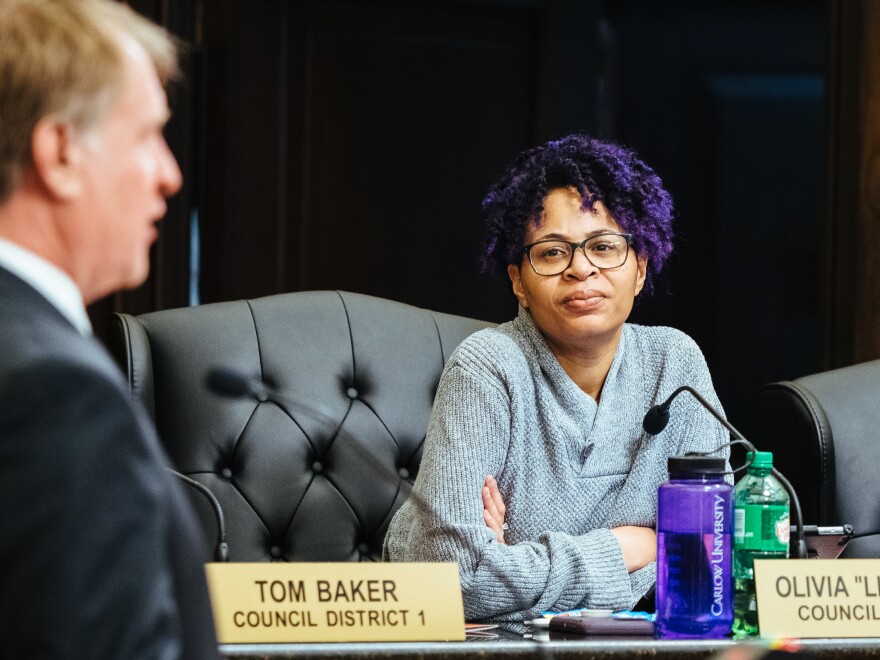Allegheny County Council on Tuesday rejected two measures that Democrats Liv Bennett and Bethany Hallam proposed in response to Black Lives Matter protests and the coronavirus pandemic. But in a unanimous vote, council approved an ordinance aimed at protecting transgender people from discrimination in health care settings.
The first of Hallam and Bennett’s defeated proposals would have prohibited the Allegheny County Police Department from using “less-lethal” weapons, such as bean-bag rounds and pepper spray, to disperse protests. The second would have mandated COVID-19 testing for all staff and occupants at the Allegheny County Jail and the county’s four Kane nursing homes.

Bennett and Hallam, who have emerged as leading progressive voices in their first year on the 15-member council, proposed the less-lethal munitions ban in early June. Days earlier, Pittsburgh police had used the crowd-control devices to break up two protests over systemic racism and police brutality.
But on Tuesday, council voted 12-3 against the ban. Only Hallam, Bennett, and fellow Democrat Anita Prizio supported the measure. Democrats Pat Catena, Tom Duerr, Nick Futules, Paul Klein, Bob Macey, John Palmiere, Bob Palmosina, DeWitt Walton, and Paul Zavarella voted it against it, as did council’s three Republicans, Tom Baker, Sam DeMarco, and Cindy Kirk.
“These less-lethal devices and serious efforts to de-escalate tense situations are mitigating factors that might forestall or avoid a far darker outcome,” Klein said. He added that a proposed countywide police review board pending at council would increase accountability for misuse of the weapons.
Law-enforcement officials had previously told councilors that without less-lethal devices, officers likely would resort to using deadly force more often, or choose not to intervene in dangerous situations at all. Critics of the munitions note, however, that the weapons have critically injured demonstrators in other parts of the country and can be fatal in rare instances.
Council on Tuesday also blocked the proposal to require universal COVID-19 testing at the county jail and Kane nursing homes. Sponsored by Hallam and Bennett, the bill failed in a 10-5 vote. Catena, Klein, and Prizio joined the bill sponsors in supporting the legislation.

On Tuesday, the county reported four active infections within the jail population and three among residents at the Kane Center in Ross. In the spring, however, the virus ravaged the Kane Center in Glen Hazel, accounting for many of the 19 coronavirus-related deaths reported at the facility. A total of 32 people incarcerated at the jail, meanwhile, have been diagnosed since mid-March, according to the county, though 28 of those have since recovered. Thirteen Kane employees and one jail employee were also fighting infections on Monday, county data indicates.
Before casting his vote against the universal-testing measure Tuesday, Duerr noted that his aunt was among those who died during the COVID-19 outbreak at the Kane Center in Glen Hazel.
At the time, he said, “I felt that I had to do something, and … at this current moment I struggle with wanting to act with emotion.”
“But at the end of the day, I knew I had to set my emotions aside," he added. "I knew that listening to the experts … we’re going to get through this crisis with as little loss of life as possible.”
While Gov. Tom Wolf ordered skilled nursing facilities to test all staff and residents in June, the county’s chief epidemiologist, LuAnn Brink, said in May that expanded testing would not help to contain the disease at the jail. She said with high turnover among inmates, any round of mass testing would provide only a snapshot of how extensively the disease has spread. Such a limited view could lead to complacency if it reveals few positive cases, Brink said.

But Hallam noted that the risk for coronavirus outbreaks is especially high in group-living facilities like the jail and nursing homes. Such facilities, she said, “are literal cesspools for diseases such as COVID-19.”
“Our most vulnerable populations deserve to be protected, or have the opportunity to be protected, by receiving COVID-19 tests,” Hallam said.
Still, at council’s meeting Tuesday, Hallam sought to broaden the legislation to offer testing to all county employees. A similar amendment failed in a committee vote last week, but on Tuesday Hallam proposed making the tests optional for all county personnel. Despite that modification, the amendment did not secure a majority of votes, with only Bennett, Hallam, Catena, Palmosina, Prizio, and Zavarella supporting it.
A third bill, which adds protections for transgender people to the county’s non-discrimination policy, did win approval in a unanimous vote Tuesday. The legislation extends the county’s prohibition of discrimination based on gender identity or expression, or sexual orientation, to medical treatment settings.
Klein introduced the measure last month, shortly after the Trump Administration issued a rule that eliminates Obama-era anti-discrimination protections for transgender people who seek health care. The new federal rule is set to take effect by mid-August, but a lawsuit seeks to block it.
On Tuesday, council also took up a new bill that would require county departments to report planned staffing changes and salary increases to council at least two weeks before the body’s annual budget deliberations. Democrats Catena, Hallam, and Prizio are sponsoring the legislation.
The proposed ordinance states that personnel accounts for about 40 percent of the county’s budget. If the legislation passes, the county executive, controller, district attorney, sheriff, and treasurer would need to furnish the required reports.
Catena noted that “one of [council’s] primary functions is obviously the budget.” And he added, “We need to understand if there’s going to be any large [pay] increases. And if there is going to be any large increases, those increases need to be justified.”




